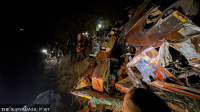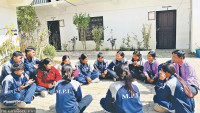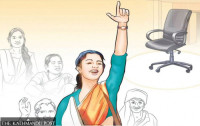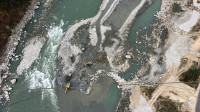National
Ruling party’s repeated failures to ensure representation call its commitment to inclusion into question
The recent selection of the top leadership in its district and metropolis committees has shown a distinct failure to be inclusive, which is mandated by law.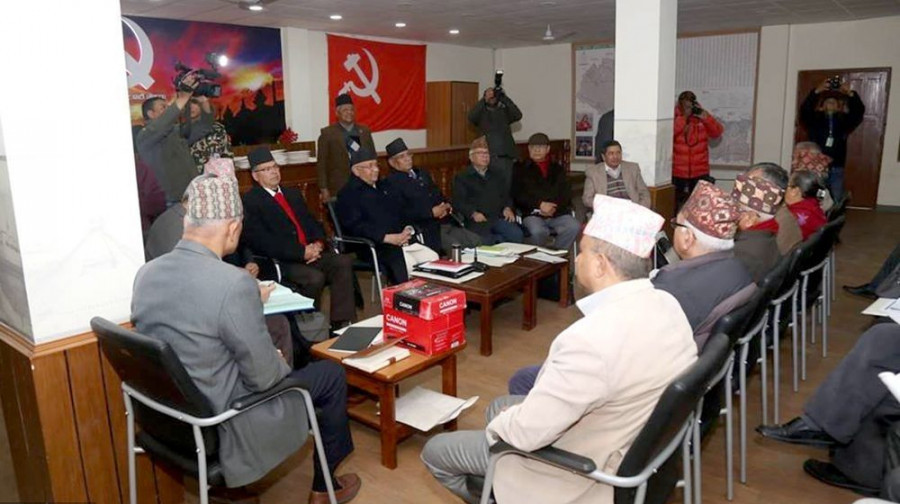
Tika R Pradhan
The constitution, along with the party’s own statute, states that all parties should abide by the principle of inclusion while selecting the top leadership of its various committees. As part of the work division for its central committee members, the party had selected the top leadership of its 77 districts and six metropolis committees on July 21. However, numerous party leaders have expressed serious concern over the negligible representation of women, Dalits and Janajatis in the party committees.
“Inclusiveness is not in the dictionary of top party leaders,” said Anjana Bishankhe, a lawmaker and central committee member. “They only know their kin and their factions. Even when it comes to their factions, they choose weak leaders who don’t oppose them or think critically.”
Of the 83 district and metropolis in-charges selected, 59 are Brahmins and Chhetris (71%), 14 are indigenous nationalities (16%), four from the Madhesi community (4.8%), one each from the Muslim and Dalit communities and four are Tharus.
The party’s interim statute states that all committees will pick women for at least one-third of positions. However, only 10 women are in leadership positions, with eight of them from the Brahmin-Chhetri community. Women’s representation as committee chiefs amounts to just 12 percent.
This lack of representation makes the ruling party technically illegal, according to the Election Commission. Legally, parties are required to have a 33 percent representation of women in its central committee. In June 2018, the newly merged party had asked the Election Commission for an exemption from the law citing the ‘extraordinary situation’ its formation following the merger of the two largest communist parties in the country. The commission had agreed to register the party after it vowed to fulfill the inclusion quota through its general convention, which it had stated that it would hold within two years of merger.
However, with no legal provisions for such ‘exceptional’ cases, the Nepal Communist Party has no legal base to continue asking for an exemption, and as such, could be liable for punitive measures from the commission.
“We registered the party trusting that it would fulfil the legal provision through their upcoming national convention,” said election commissioner Ishwori Prasad Poudyal. “All parties must abide by constitutional provisions. We will do what is necessary if they fail to follow the principle of inclusiveness as per the constitutional provision.”
While party leaders claim that it wasn’t possible to address the provision of inclusion as leaders were selected from among those who had led the committees before the merger, others question the party leadership’s commitment to inclusion.
“The leadership has failed to rise above traditional thinking and take decisions with a broader heart,” said central committee member Tilak Pariyar, who is a veteran leader of the Dalit rights movement.
Pariyar, coordinator of the Dalit Mukti Morcha, said that the party’s had failed to cultivate leadership among underprivileged groups by refusing to select them as leaders.
Underprivileged groups and classes form one of the strongest bases of any communist party and with the party committees not reflecting this base, it might gradually lose their support, said Yubaraj Chaulagain, a central committee member.
“For the party that led the struggle for inclusiveness, it is shameful that none of our committees are inclusive,” he said. “It’s not only a matter of assigning a role to a particular leader, but the question of unifying all sections of society with proper justice.”
Earlier, when the party finalised names of chairpersons and secretaries of the districts, many party leaders had protested, forcing top leaders to promise to ensure inclusion.
But despite its promises, the Nepal Communist Party has time and again failed to ensure adequate representation in the party. Of the 77 chairpersons appointed to the district committees on April 22, only three were women—Munu Sigdel of Makwanpur, Ruku Lamichhane of Kavre and Madhu Adhikary of Lamjung—while Som Maya Rai of Ilam was the only woman secretary nominated.
Only two district committee chiefs—Prabhu Hajara of Parsa and Yam Bahadur Pariyar of Chitwan—were from the Dalit community and 19 from the indigenous community.
The larger problem, however, lies with the Central Committee itself, which is the party’s central executive body. The Election Commission has mandated 33 percent representation for women in any party, and yet, the Nepal Communist Party’s 441-member-strong Central Committee has just 75 women.
Clause 15 (4) of the Act on Political Parties mandates at least one-third women members in all the committees of the party. In order to register a political party, Article 269(4) (c) of the constitution clearly states that there must be a provision of inclusive representation in its executive committees at all levels, reflecting the country’s diversity.
The Central Committee only has 21 Dalit members, despite constituting 13.2 percent of Nepal’s population. The 45-member Standing Committee has only one Dalit member—Chhabilal Biswokarma—and two women—Asta Laxmi Shakya and Pampha Bhusal.
There is no women or Dalit representation in the nine-member Secretariat, the party’s highest body. It has only two members from the indigenous community.
Earlier, in June, lawmakers representing the ruling party had protested a vacancy notice published by the Public Service Commission, saying it did not satisfy the inclusion provision. A parliamentary committee had then directed both the government and the Public Service Commission to withdraw the notice.
***
What do you think?
Dear reader, we’d like to hear from you. We regularly publish letters to the editor on contemporary issues or direct responses to something the Post has recently published. Please send your letters to [email protected] with "Letter to the Editor" in the subject line. Please include your name, location, and a contact address so one of our editors can reach out to you.




 12.62°C Kathmandu
12.62°C Kathmandu
